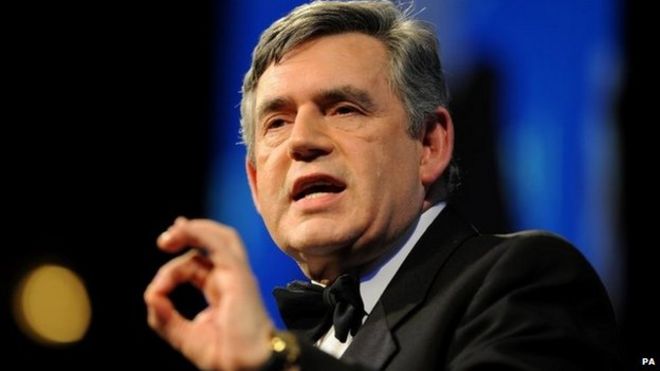
Gordon Brown is to intervene in Labour's leadership race for the first time, saying the party needs credible economic policies to win power.
He is also expected to say he strongly disagrees with many of Jeremy Corbyn's economic and foreign policies.
His comments come as a poll suggests Mr Corbyn is considered the candidate most likely to worsen Labour's prospects of winning the next election.
The other leader candidates are Yvette Cooper, Liz Kendall and Andy Burnham.
Voting has now opened in the contest to replace former party leader Ed Miliband.
Mr Brown, the former prime minister, will deliver an address on "power for a purpose".
It comes after his predecessor at Number 10, Tony Blair, warned that Labour risked annihilation if it elects Mr Corbyn - currently seen as the front-runner.
Paul Sinclair, a former adviser to Mr Brown, told the BBC: "I think he'll be a little bit more conciliatory than Tony Blair has been, but no less unequivocal."

Analysis: Alex Forsyth, political correspondent, BBC News
Those following Labour's leadership contest have been awaiting Gordon Brown's view with interest.
The former prime minister has form on powerful interventions. During the Scottish referendum he delivered a tub-thumbing speech in the final week, much credited with boosting the pro-union campaign.
Today he may stop short of criticising individual candidates, but his message will undoubtedly be interpreted in light of the continued popularity of Jeremy Corbyn. So far warnings about his possible victory from Labour's big beasts, including Tony Blair, Alistair Campbell and Alan Johnson, don't seem to have dented his campaign.
And given that his supporters believe he represents a new politics, they may not heed such criticism from established politicians.

A ComRes study of 2,035 adults in Britain, for the Independent on Sunday and Sunday Mirror, found 31% of those polled thought Mr Corbyn would worsen Labour's prospects of electoral success.
Ms Cooper was rated as 18%, Ms Kendall as 17% and Mr Burnham as 14% - making him the poll's least damaging candidate.
Conversely, 21% thought Mr Corbyn would be most likely to boost Labour's chances of winning the next election, while Mr Burnham polled 19%, Ms Cooper 15% and Ms Kendall 11%.
None of the candidates, though, proved as popular in the poll as former foreign secretary David Miliband, who was defeated by his brother Ed at the last Labour leadership contest.

Labour leadership contest

- Who are the candidates? Andy Burnham, Yvette Cooper, Jeremy Corbyn, Liz Kendall
- Dates: Ballot papers were sent out on 14 August; voting can take place by post or online. They must be returned by 10 September. The result is on 12 September
- Who can vote? All party members, registered supporters and affiliated supporters - including those joining via a union
- What is the voting system? The Alternative Vote system is being used so voters are asked to rank candidates in order of preference
- How does it work? If no candidate gets 50% of all votes cast, the candidate in fourth place is eliminated. Their second preference votes are then redistributed among the remaining three. If there is still no winner, the third place candidate is eliminated with their second preferences (or third in the case of votes transferred from the fourth place candidates) redistributed. It is then a head-to-head between the last two candidates

Mr Brown's speech comes as Mr Burnham claimed he was the only candidate capable of blocking Mr Corbyn and preventing a split within the party.
He told the Sunday People: "In the 80s, we started fighting each other and left the way clear for Margaret Thatcher to bulldoze her way through Labour communities.
"I'm not going to let that happen this time."
The BBC's political correspondent Carole Walker said it was unclear whether the former prime minister would declare his support for Ms Cooper - though it is understood he believes she is the best candidate.
Labour leadership poll
610,753
total electorate, though this may fall as party removes those not entitled to vote
- Of which, full party members:299,755
- Affiliated to a trade union:189,703
- Registered to vote by paying £3:121,295
Meanwhile, Mr Corbyn has promised to "stand up" for businesses who "want to cooperate and innovate for the public good".
He told the Observer: "The current government seems to think 'pro-business' means giving a green light to corporate tax avoiders and private monopolies."
Ms Cooper has criticised some of Mr Corbyn's anti-austerity policies, telling the Sunday Mirror: "I don't think the answer is what Jeremy has proposed, which is basically printing money that we haven't got to build things."
Ms Kendall told the BBC she also wanted "a radical Labour government", but added: "I want a credible Labour Party that can oppose the Tories and win elections."
Former Labour minister Kim Howells told BBC Radio 4's Broadcasting House programme the party was in "big trouble".
"I think we'll probably have at least one more Labour leadership election before the next general election," he said, "because if Jeremy Corbyn is elected then I'm afraid the other political parties are going to zero in on the more controversial parts of his beliefs and policies and they're going to rubbish them."


Post a Comment